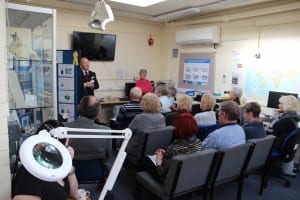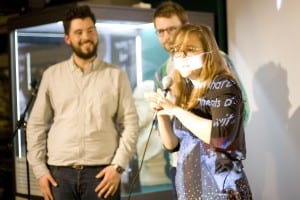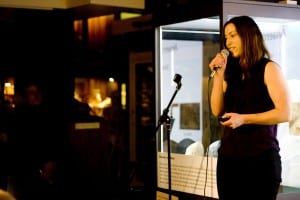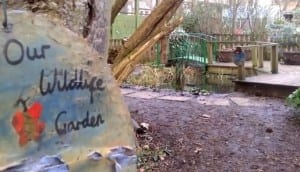Boxing clever
By Lizzy Baddeley, on 15 September 2014
Philipp Boeing and Bethan Wolfenden won Focus on the Positive in May with their project ‘Darwin’s Toolbox’. Philipp updates us here about the newly renamed ‘bento-lab’ project.
In May, we won a Focus on the Positive award at the Grant Museum with our vision of making biotechnology accessible and easy-to-use outside of academia. Previously we had created a small laptop-sized molecular biology laboratory called bento·lab (formerly: Darwin Toolbox).
Bento·lab is a powerful, personal laboratory, and it is our hope to enable all curious minds to engage with biotechnology any place and any time.
The money won at Focus on the Positive enables our group to go out “into the wild” and host trial workshops for teenagers, families and other groups in schools, city farms and community centres, where we hope to make the invisible world of biology and biotechnology visible and exciting.
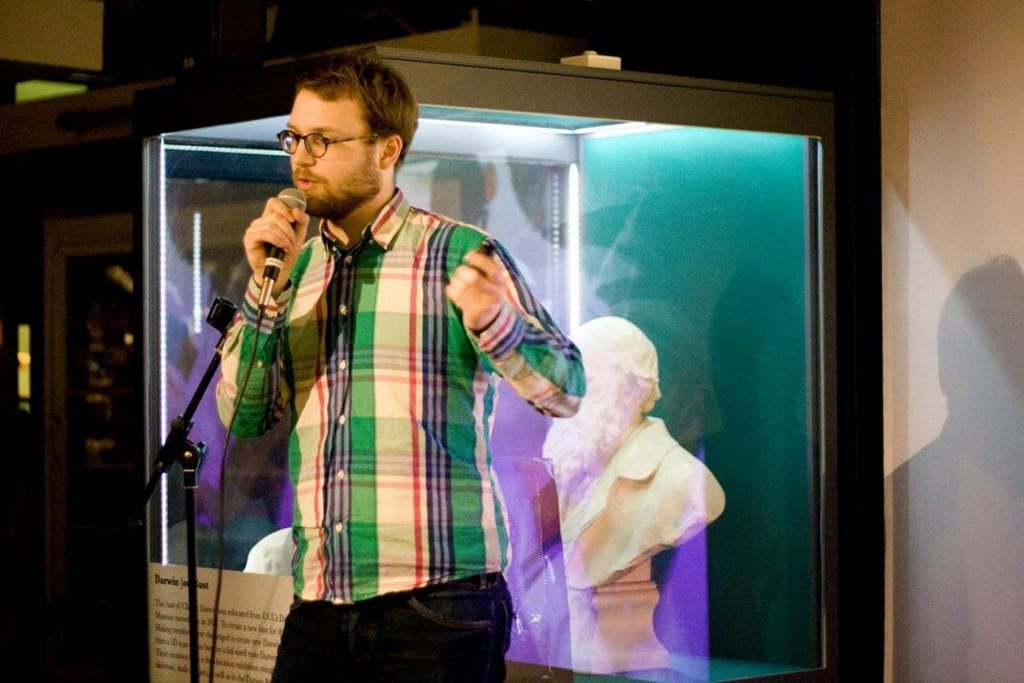
Philipp Boeing pitching for “bento·lab” (formerly: Darwin Toolbox) at Focus on the Positive in the Grant Museum
This idea began two years ago with a project called “The Public BioBrick” – incidentally also exhibited at the Grant Museum! As part of a UCL student team taking part in the IGEM competition, we initiated a collaboration with a group of amateur biologists based at the London Hackspace in Hackney to explore the notions of rights and risks surrounding access to biotechnology outside of traditional institutions.
From this collaboration we found that biotechnology is often obscure to those outside of the immediate field. It is our aim to increase the visibility of biotechnology, and explore if different groups can form a direct relationship with biotechnology through hands-on engagement. This ties in with our aims for bento·lab as a whole: We are curious to find out what projects can be enabled if laboratory equipment becomes much more mainstream and affordable, and how we can support that process.
We’d like to say “thank you” to everyone who supported us at Focus on the Positive and beyond, and we hope you’ll follow our trip into the unknown world of mainstream citizen biotechnology. This summer, we began testing out workshop ideas at events like Green Man Festival and EMF camp – more on this in our next blog post in a couple of months’ time.
Both Bethan and Philipp have recently finished degrees at UCL: Philipp graduated with an MEng in Computer Science and Bethan with a BSc in biochemistry.
Positively Brilliant News to Focus on…
By Lizzy Baddeley, on 17 July 2014

Kimberley, Lizzy and Steve from
the UCL Public Engagement Unit
A few weeks ago, the Focus on the Positive team got some brilliant news, and spent the day celebrating. Sadly not all the team could be there. Focus on the Positive organisers Hilary Jackson and Lizzy Baddeley tell what happened.
Hilary: A few weeks ago I left London to have a lovely holiday in Barcelona. There was sunshine. There was tapas. There was good company and good music. What I had to experience only by text message was a pretty exciting piece of news from Lizzy, who was living it up at Universities Week at the Natural History Museum back in London…
Lizzy: Indeed Hilary, you missed an exciting Wednesday. Focus on the Positive was up for an ‘Engage’ award from the National Coordinating Centre for Public Engagement (NCCPE). They were giving out a few different awards, and we had been shortlisted with two other projects in the Collaborations category. The nicest part for us was that they classed our collaboration with out event audiences as the best bit! (We knew this already, but it’s always nice to hear if from someone else).
The competition in our category was from a really great project from Bristol University ‘Sustainable management of intestinal parasites of livestock in Botswana’ and another UCL Public Engagement Unit project, Creating Connections, where UCL staff and postgraduate students with representatives from community organisations, charities, residents’ groups, social enterprises and statutory organisations, with the aim of finding ways to work together. It was rather nerve wracking to be up against such good competition – especially as the other UCL project is run by Laura Cream – who sits on the desk next to me!
So we arrived at the Natural History Museum for the awards ceremony, with quite a few members of UCL staff, and were treated to a rather lovely ceremony. Just like the Oscars there was a celebrity host (Professor Alice Roberts) and each project had had a short film made about it. We waited with bated breath as the Collaborations category was introduced, and then cheered very loudly when Focus on the Positive was announced the winner!
I had to go up on stage as Hilary was too busy sipping red wine and sunbathing – but I got a lovely photo with Alice! And a very pretty award.
After the event, we all got to troop through to what I think was the geology gallery for some fizzy wine and scones. It really was like the Oscars!
We are, of course, sad that the other UCL project did not win – but I’ve put the award between my desk and that of my Creating Connections neighbour, so we can both bask in NCCPE glory.
Hilary: So, while I love a holiday as much as the next public engagement coordinator, I wish I’d been in London that Wednesday to celebrate with the team! Luckily, I get to help spend our £1000 prize money, which will be used to support funded Focus on the Positive projects to continue their good work.
Lizzy: And lets not forget: none of this would have happened without the our funding from the Engineering and Physical Sciences Research Council (EPSRC). We’ve got another few events before this funding runs out – so come along to the next one at the Grant Museum of Zoology on October16th!
You can read more about the award on UCL News and on the NCCPE website.
Update: London Implant Retrieval Centre open days
By Lizzy Baddeley, on 3 July 2014
Gwynneth Lloyd updates us on her Focus on the Positive project at the London Implant Retrieval Centre. You can read more about the project in Gwynneth’s first blog post.
It is hard to believe that it is four months since our last Open Day. We had given the visitors in February a questionnaire on the value of the day to them and most were happy with the format we used. We decided to do something similar in June.
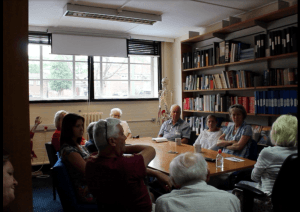
Our visitors started arriving at 10.30 and it was all go till 3.00 when the last visitors left. We had 17 ex-patients and most of them brought a partner. We also extended an invitation to other people within the hospital. The research team paid us a visit and were most impressed with our laboratories and the work we do.
Once again, patients handled their implants and asked lots of questions about causes of failure. We also had a patient discussion group in the library, which was videoed by a doctor for use in his MD. Lunch was enjoyed by all with many leaving a cash donation to help pay for the sandwiches.
Finally, Prof Hart spoke about the Metal on Metal implant problem for 90 minutes and had an attentive audience. We had to stop people in the end, we ran out of time.
Our next Open Day? – sometime in early December. We will make some changes based on the questionnaire results from this Open Day.
More information can be found on the London Implant Retrieval Centre website.
Changing perspectives on the London riots
By Lizzy Baddeley, on 2 June 2014
Our first ever winner, Dr Hannah Fry, tells us about her experiences running her Focus on the Positive project.
 I won the first Focus on the Positive event back in March 2012 for a project exploring the human side of the London riots in a short film.
I won the first Focus on the Positive event back in March 2012 for a project exploring the human side of the London riots in a short film.
At the time I was working as a research associate at UCL, studying the patterns in the London riots of 2011. During the mathematical analysis, we came across some links which surprised and shocked me, but which I didn’t have an opportunity to investigate as they weren’t the main focus of our academic paper.
As many people who lived in London at the time might have guessed, the people involved came from some of the most deprived neighborhoods of the city – places with the lowest incomes, the worst schools and the poorest living environment, but these were also areas which had been worst hit by disproportionate cuts to their youth services, which had been creating huge issues for the young communities in and around where the riots took place.
In Harringay for example, where the riots began, 8 out of 13 youth centres had been closed down in the months leading up to the riots and one local resident, Chavez Campbell, even predicted that there would be trouble on the streets that summer in an interview with the Guardian just a week before the riots materialised.
I wanted to try and understand a bit more about the human side of the riots and to hear directly from the people that the media had been so quick to demonise in the wake of the events. The prize money from Focus on the Positive gave me the perfect opportunity to explore what had happened from a different perspective and to connect with the communities who had had so much written about them, but so little opportunity to offer their own opinions. It gave me the chance to make a short film that would clearly lay out my findings.
During the research for the film I interviewed charities, youth workers and young people across the capital and I heard stories that shocked, appalled and surprised me – even as a Londoner myself. I came away with a new view of what had happened – to my mind, the riots were not the result of innate criminal instincts lying dormant in certain groups of society but a manifestation of deeper underlying problems in our cities.
I had originally wanted to capture the voices of the young people I had spoken to on film, but it turned out to be much more difficult than I had expected to get people to open up on camera, but I hope that, regardless, the short piece which resulted might offer some insight into another way of looking at things.
Dr Hannah Fry is a lecturer at the UCL Centre for Advanced Spatial Analysis where she researchers Complexity Theory.
Driving them wild at the Dana Centre
By Hilary L Jackson, on 21 May 2014
The sun shone on South Kensington last Tuesday as five intrepid researchers, and around a hundred members of the audience, took Focus on the Positive on its first foray beyond Fitzrovia (well, Bloomsbury).
Our fearless host and former prizewinner Hannah Fry welcomed the audience to the Science Museum’s Dana Centre, encouraged them to listen carefully to the researchers, and choose their favourite project to win the £2000 prize.
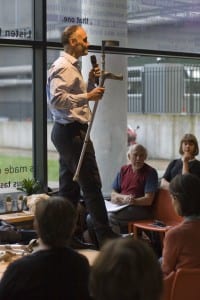 First up, Clemence Cavoli (UCL Civil, Environmental and Geomatic Engineering) told us about chapas, the main transport option in Mozambique’s capital, Maputo. Chapas provide transport to thousands of people each day, but they’re privately run, hard to predict, and completely unmapped. For £2000, Clemence and her colleague Joaquin want to start working with chapas drivers to map their routes in the city. Can they make a map as successful as the London tube map?
First up, Clemence Cavoli (UCL Civil, Environmental and Geomatic Engineering) told us about chapas, the main transport option in Mozambique’s capital, Maputo. Chapas provide transport to thousands of people each day, but they’re privately run, hard to predict, and completely unmapped. For £2000, Clemence and her colleague Joaquin want to start working with chapas drivers to map their routes in the city. Can they make a map as successful as the London tube map?
Next came Nikos Papadosifos (also UCL Civil, Environmental and Geomatic Engineering), crutches in hand, to tell us why the sticks given to most of us by the NHS are not doing us justice. He asked for help to create a handle design the won’t cause the common problems of elbow and shoulder inflammation and skin irritation.
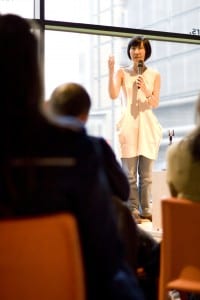 After Nikos, UCL urban food researcher Marina Chang talked about her love of the Calthorpe Project. Marina told us that urban gardens are rarely productive, but Calthorpe is exceptional. The thirty-year-old city garden, on busy Gray’s Inn Road, has just installed a biodigester, but they need more space to grow vegetables and capitalise on the heat and fertilizer they create. Would the audience help Marina buy polytunnels and other materials to expand Calthorpe’s vegetable patch?
After Nikos, UCL urban food researcher Marina Chang talked about her love of the Calthorpe Project. Marina told us that urban gardens are rarely productive, but Calthorpe is exceptional. The thirty-year-old city garden, on busy Gray’s Inn Road, has just installed a biodigester, but they need more space to grow vegetables and capitalise on the heat and fertilizer they create. Would the audience help Marina buy polytunnels and other materials to expand Calthorpe’s vegetable patch?
 Tia Kansara, UCL Energy Institute, told the audience about her plans to create a zero waste area in North London. Could the communities of Primrose Hill come together to reduce, reuse and recycle their unwanted resources. Tia is already working with local people to do this, but needs some help to bring people together and make new connections.
Tia Kansara, UCL Energy Institute, told the audience about her plans to create a zero waste area in North London. Could the communities of Primrose Hill come together to reduce, reuse and recycle their unwanted resources. Tia is already working with local people to do this, but needs some help to bring people together and make new connections.
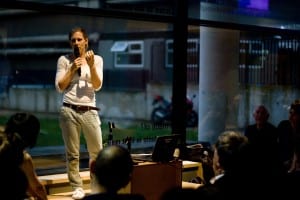 Finally, Isabel Christie (UCL Medical Physics and Bioengineering) showed us the difference between good and bad scientific animation. Great animation, Isabel argued, can bring scientific concepts to life, but poor animation, often made by scientists using powerpoint, is the norm. In the long term, Isabel wants to create a graduate degree course for scientific animators to develop their skills. Would the audience help her to scope this by paying for a workshop this summer, bringing together experts in the field?
Finally, Isabel Christie (UCL Medical Physics and Bioengineering) showed us the difference between good and bad scientific animation. Great animation, Isabel argued, can bring scientific concepts to life, but poor animation, often made by scientists using powerpoint, is the norm. In the long term, Isabel wants to create a graduate degree course for scientific animators to develop their skills. Would the audience help her to scope this by paying for a workshop this summer, bringing together experts in the field?
The audience quizzed the speakers soundly in half an hour and confidently made their decisions. Hannah asked them to provide their own drumroll before announcing that Clemence was the winner! Clemence and Joaquin will be taking £2000 to Maputo to help them create a map for the city’s transport. In second place, Marina was delighted to be able to offer her £1000 to the Calthorpe Project in time for their 30th birthday celebrations!
 Keep up to date with your favourite projects by following us on Twitter @focuspositive and here on the blog, where our prize-winners will be posting soon.
Keep up to date with your favourite projects by following us on Twitter @focuspositive and here on the blog, where our prize-winners will be posting soon.
Focus on the Positive is funded from UCL’s Impact Acceleration Account from the Engineering and Physical Sciences Research Council.
It’s hip to be square at the London Implant Retrieval Centre open day
By Lizzy Baddeley, on 10 April 2014
In January, Gwynneth Lloyd won £1000 from the London U3A to support her work with the London Implant Retrieval Centre (LIRC) patient group. Gwynneth manages the LIRC, and runs the patient group for people who have had Metal on Metal hip replacement removed and has been able to use the money from from Focus on the Positive to fund more activities with the group.
Weeks of preparation were over. June 16th had arrived – our 2nd open day for patients. Except now they are not patients, they are all well and mobile, thanks to the skill of surgeons. They have had their Metal on Metal (MOM) implants revised and have come to our open day.
Twenty four people came to this event and spent 4 hours with us. They had coffee on arrival, toured our offices and saw the equipment we use, watched a video about what we do and then handled their own implants and discussed their experiences with fellow patients. We provided lunch for everybody thanks to the money I won from Focus on the Positive. This was followed by a talk from John Skinner, surgeon, about the latest research being undertaken and then a question and answer session.
It is amazing how people respond. Everyone feels that we are doing worthwhile work even if we haven’t found an answer for failed implants. Everyone seems to have enjoyed the day according to our exit questionnaire. Many ask about how they can support us. Our biggest problem now is our website: I hope to spend some of the £1000 I won on improving the site.
What next? Another open day later this year – it is time to start planning again!
The LIRC is a research institute at UCL, located at the Royal National Orthopaedic Hospital in Stanmore. It leads the way in understanding how best to improve the performance of hip replacements. Metal on metal replacements are of particular interest, as they have been found to wear down at an accelerated rate in some patients. This deterioration can potentially cause damage to the bone and tissue around the hip and possibly cause traces of metal to leak into the bloodstream. The NHS recommends all patients with metal on metal replacements to have annual check ups to monitor signs of these problems. More information and advice can be found on the NHS website.
Sticking it to the Man
By Lizzy Baddeley, on 25 March 2014
In January 2014 Roselle Thoreau took part in a special Focus on the Positive event in partnership with the U3A (the University of the Third Age). Roselle won the first prize of £2000 and shares her experiences of taking part. Look out for more updates from Roselle as her project unfolds.
For me, gaining support for research projects has always been defined in terms of grants and tenders. Dry documents with mission statements, financial justifications, milestones, and track records. Projects which, whilst very important, have societal impacts that take years to occur.
My perspective changed when I went to a Focus on the Positive event run by the UCL Public Engagement Unit.
It was a revelation – a completely different way of approaching academic content. It focused (as the title suggested) on all the positive that research can do. It was a reminder of why, as researchers, we chose our careers. Through listening to the pitches that evening it also showed me that small ideas for small projects with small budgets can have a big impact.
So when the chance came I applied to take part.
My research looks at the difficulties older adults have with mobility. I have a small cohort of older adults who visit me regularly in the lab. Over the last year many of my cohort have started to use walking sticks. The sticks, bought in the local chemist or by their children, had not been adjusted to their personal needs.
A search of the market revealed many different types of sticks are available but very little information as to what the differences are or which stick might suit best. A little further research showed that a stick that doesn’t fit the person can actually make them walk less than they would without any stick at all.
I wanted to help my participants and the many others like them who need to use a stick but don’t know how to find an appropriate one. My project is to create and disseminate an easy-to-read guide about walking sticks that gives people the access to the information they need to make a good choice. A small project with a potentially big impact.
I’d never really thought about pitching this project before. I’d certainly never thought about pitching it to people outside academia.
It was a daunting prospect – to stand up in front of a room full of strangers and convince them of your project’s worth. To ease this we were given training in how to pitch an idea. A few hours with Steve Cross, the Head of the Public Engagement Unit at UCL, was enough to completely alter my perspective of presenting: not just presenting a pitch, but presenting my research in any setting. Steve taught us the importance of knowing who is in your audience and of making your presentation relevant to them. He also taught us how to break down your pitch into five different segments, each appealing to a different type of audience member.
My project would be difficult to fund through traditional academic methods. Focus on the Positive was a perfect way to gain support for something small yet powerful. It has taught me a new skill (pitching) and a new way of approaching ideas. Now all I need to do is put my plan into action. Next time I write, I’ll be able to tell you about the journey of creating the guide and how I plan to reach the people who need to access it the most.
‘Grant’-ing wishes at UCL Museums
By Lizzy Baddeley, on 10 March 2014
 On February 27th, Focus on the Positive headed over the Grant Museum of Zoology for a special event. The host, and Grant Museum Learning and Access Officer, Dean Veall, shares his thoughts on the event.
On February 27th, Focus on the Positive headed over the Grant Museum of Zoology for a special event. The host, and Grant Museum Learning and Access Officer, Dean Veall, shares his thoughts on the event.
We’ve hosted a variety of events (film nights, game shows etc) in the Grant Museum but none have been quite like Thursday 27th February’s event. That event saw our speakers talking about Crystal Palace Dinosaurs, London’s bats, faecal digesters and molecular biology all trying to cajole, convince and in one case bribe the audience to win the £2,000 prize. The event in question was Focus on the Positive.
Here at UCL we have researchers working on a wide array of subjects, everything from nano-technology to fine art, Scandinavian studies to medicine and we want to engage the public with that research. We have long drawn upon this talent to enrich the museum’s public events programme, using some of the very best researchers to share their work with our keen following of visitors. We’ve had Joe Cain shining light on some brilliantly awful b-movies, Kate Jones discussing the potential for technology to change the way we think about wildlife conservation, Mark Maslin discussing human population and Steve Jones sharing his thoughts on evolution, to name a few.
But what does it mean to engage the public with research? One way is indeed sharing and telling people about your research, but it can be a fairly passive experience; the challenge is to encourage people to actively have a stake and take an interest in your work. And that is exactly what Focus on the Positive aimed to do. The format was devised by the brilliant team at the UCL Public Engagement Unit and is a simple one, researchers have to pitch to the audience their ideas for making a change in the world based on their research and the audience votes to decide who gets £2,000 to make their ideas happen. We were keen to get in on the action and give our audience a chance engage with some brilliant research activities here at UCL.
On the night a lively audience, were given the criteria they should judge each project against:
- Is it value for money? – was the project the best way to spend this pot money?
- Is it realistic? – with the cash would they actually achieve what they aspired to?
- Is it a worthwhile endeavour? – would the project actually make a difference?
With that in mind and voting tokens in hand we heard four very different pitches for the £2,000 prize.
Crystal Palace Dinosaurs
First up was Joe Cain. Joe was asking for the cash to save the Crystal Palace Dinosaurs. These marvels of Victorian construction are a listed monument housed in the grounds of Crystal Palace Park and date back from the time of the Great Exhibition in 1851. Neglected over the years and falling apart these historically important beasts are in need of attention and Joe was pitching for the cash to start a fund raising campaign that would raise £1.5 million to save them before they became lost forever. His impassioned pleas were illustrated with harrowing images of these crumbling monuments.
Darwin’s Toolbox
Next up was Philipp Boeing from the project Darwin’s Toolbox, Philipp and his colleague Bethan Wolfenden are both undergraduates and were pitching for their idea of creating a biotech lab in a portable toolbox sized suitcase. They wanted to spend the money turning their prototype toolboxes into working pieces of equipment that was affordable and easy to use and could be used in settings such as schools to inspire young people to get involved with real molecular and synthetic biology.
Faecal digester
Following Philipp and Bethan and hoping to win the cash was another undergraduate, Cecilia Isven. She wanted the cash to help change the world with poo, starting with Surrey Docks Farm. She wanted to use the money to help install a boiler to run an anaerobic manure digester, turning the copious amount of animal waste into energy to run the farm.
A London wildlife health check
Completing the line-up for the evening was Alison Fairbrass, a PhD student from the Engineering department. Alison’s research focus is on the bio-diversity of towns and cities, the urban landscape. She was pitching for votes to give London a wildlife health-check, carrying out wildlife surveys to discover exactly what animals we share our city with and with that information help us look after our green spaces better.
And the winner is…….
Four very different projects, very different speakers at different stages of their research careers, so, who won? When the votes were counted and the results in, the winning project was…… Darwin’s Toolbox. Philipp and Bethan convinced the audience with their aspiration to bring biotechnology to the masses. But coming in runner-up position and walking away with £1,000 was Alison Fairbrass.
Next event
Focus on the Positive was a brilliant example of public engagement with UCL’s research that trusted the audience to decide where funds could be spent. The money came from the Engineering and Physical Science Research Council and has funded projects that will have a positive impact on society. Over the coming months we will bring you updates on how these projects progress. If you couldn’t make it to the Grant Museum event, fear not Focus on the Positive is back on May 13th at the Dana Centre.
Mobility triumphs with the U3A
By Lizzy Baddeley, on 12 February 2014

Focus on the Positive organisers Lizzy Baddeley and Hilary Jackson report back on our most recent event.
At Focus on the Positive, we like to give everyone the chance to take part in our events, and we like trying new things. So, on 23rd January, we invited a group from the University of the Third Age (U3A) along to UCL to have a go at picking a worthwhile impact project to fund.
The U3A is a national organisation that provides opportunities for retired and semi-retired people to come together and learn together. Their membership is drawn from enthusiastic retired individuals who want to keep on learning and exploring the world – so who better to take part in Focus on the Positive?
More than 40 members from all over London came along on a Thursday afternoon to listen to UCL researchers pitch 4 projects, picking their favourite to win £2000.
Right from the start, the U3A participants took their task seriously. They listened avidly and thoroughly quizzed the researchers. After careful deliberation, each cast their vote.
The winner of the event was Roselle Thoreau, a doctoral researcher in the UCL Centre for Transport Studies, taking the £2000 prize to develop her project to get unbiased and helpful information to potential buyers of mobility aids. Roselle researches mobility in older people, and has noticed that many older people buy walking sticks without advice from a professional. These sticks, if incorrect, can actually make mobility worse! The crowd really responded to her enthusiasm and dedication and Roselle promised to keep them updated with her progress.
Second place was tightly fought, and in the end two projects received the same number of votes to take the £1000 runner-up prize.
Gwynneth Lloyd will use her winnings to support the Friends of the London Implant Retrieval Centre. This great project, which Gwynneth runs up at the Royal National Orthopaedic Hospital in Stanmore, supports patients who have had hip replacements removed. The money will be greatly appreciated in getting the Friends together to share their experiences, provide mutual support, and advise researchers and clinicians about what patients need.
The other winner of £1000 was Dr Mohammed Shamsudduha, a Research Associate at UCL’s Institute for Risk & Disaster Reduction. Shams will use the money to complement his research into salt and arsenic poisoning in groundwater wells in Bangladesh. £1000 will allow him to draw on his research and experience to build two safe wells providing reliable, safe drinking water for hundreds of people.
Sadly, not everyone could be a winner. Despite drawing a number of votes, Bethan Wolfenden and Philipp Boeing (UCL Synthetic Biology undergraduate students) didn’t win a prize. None-the-less, the UCL Public Engagement Unit will help them to find other ways to make their DIY Synthetic Biology sessions for the U3A happen.
It was a great, lively event, and the U3A were a really great audience. It was great to see a new group really get to grips with Focus on the Positive and support such worthwhile projects.
Vegetables for Victory: Promoting School Gardens Project
By Lizzy Baddeley, on 22 January 2014
In the first of our posts about past winners, Mike Fell shares his experience taking part in Focus on the Positive, and how his project took off after the event.
Last year I asked the Focus on the Positive audience to help fund a project to promote school gardens.
In the course of some research I was involved in earlier in the year I’d experienced first-hand the really beneficial role that school gardens can play. I saw children heading home clutching freshly harvested vegetables and feeding hens, and I was given enthusiastic tours of ponds and mini woodlands – all the while surrounded by social housing blocks.
I thought it would be great to win some money to help encourage the development of more school gardens, but I knew that to run a successful project I’d have to partner with the experts – people who actually (literally) get their hands dirty on a day-to-day basis. So I got together with Sophia and Sara at Pooles Park Primary in north London and we talked about the possibilities.
We hit upon the idea of running a series of workshops where classes of children from other nearby schools could come and visit the Pooles Park garden. The children would get a chance to learn a bit about gardening, and the teachers about what it takes to fund and run a successful school garden. Every child would get to take home a plant pot with seeds they had planted, while each school could order a raised bed to help kick off their own project.
Naturally I was pretty nervous about taking part in the event. Not only was I pitching to a pub full of people against many other great ideas, but I was really keen to get the project funded. I think my enthusiasm for it came across, and I was lucky enough to come in second, winning £1000.
Once the money came through, Sophia and Sara jumped into action and arranged the series of workshops. Seven other schools attended (four primary, three secondary, with a combined pupil population of over 4000), with a total of just under 200 pupils and 40 parents and teachers. The money was mostly spent on raised beds (which almost all the attending schools have now received), and one of the schools has already won funding to further develop its own garden.
I’m really pleased with how the project turned out, and the feedback we collected was great. Although I was the one who pitched for the money, the success of the project has really been down to Sophia and Sara at Pooles Park. I hope it will be possible to run the project again in future years.
– Mike Fell, PhD researcher in the UCL Energy Institute
 Close
Close






